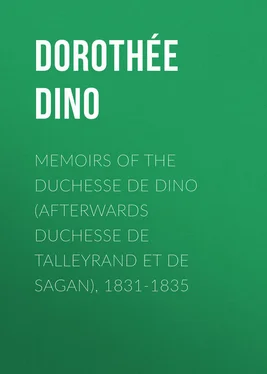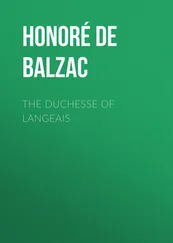Dino Dorothée - Memoirs of the Duchesse de Dino (Afterwards Duchesse de Talleyrand et de Sagan), 1831-1835
Здесь есть возможность читать онлайн «Dino Dorothée - Memoirs of the Duchesse de Dino (Afterwards Duchesse de Talleyrand et de Sagan), 1831-1835» — ознакомительный отрывок электронной книги совершенно бесплатно, а после прочтения отрывка купить полную версию. В некоторых случаях можно слушать аудио, скачать через торрент в формате fb2 и присутствует краткое содержание. Жанр: foreign_antique, foreign_prose, на английском языке. Описание произведения, (предисловие) а так же отзывы посетителей доступны на портале библиотеки ЛибКат.
- Название:Memoirs of the Duchesse de Dino (Afterwards Duchesse de Talleyrand et de Sagan), 1831-1835
- Автор:
- Жанр:
- Год:неизвестен
- ISBN:нет данных
- Рейтинг книги:4 / 5. Голосов: 1
-
Избранное:Добавить в избранное
- Отзывы:
-
Ваша оценка:
- 80
- 1
- 2
- 3
- 4
- 5
Memoirs of the Duchesse de Dino (Afterwards Duchesse de Talleyrand et de Sagan), 1831-1835: краткое содержание, описание и аннотация
Предлагаем к чтению аннотацию, описание, краткое содержание или предисловие (зависит от того, что написал сам автор книги «Memoirs of the Duchesse de Dino (Afterwards Duchesse de Talleyrand et de Sagan), 1831-1835»). Если вы не нашли необходимую информацию о книге — напишите в комментариях, мы постараемся отыскать её.
Memoirs of the Duchesse de Dino (Afterwards Duchesse de Talleyrand et de Sagan), 1831-1835 — читать онлайн ознакомительный отрывок
Ниже представлен текст книги, разбитый по страницам. Система сохранения места последней прочитанной страницы, позволяет с удобством читать онлайн бесплатно книгу «Memoirs of the Duchesse de Dino (Afterwards Duchesse de Talleyrand et de Sagan), 1831-1835», без необходимости каждый раз заново искать на чём Вы остановились. Поставьте закладку, и сможете в любой момент перейти на страницу, на которой закончили чтение.
Интервал:
Закладка:
London, May 12, 1834. – The febrile and nervous condition of the King of England becomes more and more marked; he really says the most bizarre things. At the State Ball he said to Madame de Lieven that people's minds had been rather unbalanced lately, and pointing to his cousin, the Duke of Gloucester, he added: "Now, for instance, he believes in the transmigration of souls, and he thinks that the souls of Alexander the Great and Charles the First have passed into his." The Princess replied rather flippantly: "The dear departed must be much astonished to find themselves there!" The King looked at her with an uncertain air and went on, "Fortunately he is not clever enough to bring his head to the block;" which for His Majesty is really not so bad.
What is more serious than these absurd speeches is that he sleeps ill, has frequent fits of anger, and has a childish military mania. Thus he goes to the barracks, gives the most preposterous orders without consulting the officers, reduces the regiments to disorder, and makes himself the laughing-stock of the troops. The Duke of Wellington and the Duke of Gloucester, both Field Marshals, and Lord Hill, the Commander-in-Chief, thought it their duty to make joint representations in respectful but serious terms. They were very ill received, Lord Hill being especially mishandled by his Majesty, who frightened him very much. If the poor King's mind were to give way they say it would certainly be on the subject of the army, for he thinks he has great military talent, or about women, with whom he thinks he is irresistible. They say that his only reason for hastening the Queen's departure is his desire to be a bachelor for six weeks.
He has already taken time by the forelock in handing to the Queen all the presents that she will find it necessary to give while on the Continent. The Royal Family is very anxious; they would like to prevent the King from exposing himself so much to the sun, from drinking so much sherry, from seeing so many people. They want him, in fact, to lead a more retired life till the present crisis, which is so much worse than its predecessors, has quite passed off, but he is very hard to manage.
Among his strangest remarks I must quote his inquiry addressed to Prince Esterhazy, "whether people married in Greece?" "I ask," he added, noticing that the Prince was rather astonished, "because, as of course you know, there are no marriages in Russia."
The good Duke of Gloucester, who is much attached to the King, is sincerely grieved. As to the Duke of Cumberland, he doesn't hesitate to proclaim in the clubs that the King is mad, and that it is his father's case over again. This is neither brotherly nor filial. Some people are already beginning to consider who would get the Regency if this sad state of matters should persist or become acute; it is still rather a feverish condition than absolute insanity. The Duchess of Kent doesn't count so long as the King lives and may have children. The Princess Victoria, heiress-presumptive, is not of age, and the question would therefore be between the Queen and the Duke of Cumberland, both of whom are almost equally unfavourable to the present Cabinet. Thus things will be allowed to go pretty far before the existence of the evil is admitted. Yesterday Lord Grey was saying with a great affectation of emphasis, that the King was never better in his life.
When it became known here that Jerome Bonaparte intended to come, the Court of Würtemberg was warned that it would be undesirable that he should bring the Princess, his wife, along with him, as, in spite of the near relationship, she could not be received. Jerome, therefore, came alone, and in spite of the hint he had received he sought an audience with the King which M. de Mendelsloh, the Würtemberg minister, was foolish enough to request. The moment the King heard of it, he said: "He may go to the Devil." He is so touchy about the Bonapartes that he very nearly forbade the Duke of Sussex to come to Court for having received Lucien, and took it very ill that the Lord Chancellor exposed the Duke of Gloucester to the chance of meeting the Prince de Canino at one of Lady Brougham's parties.
Lord Durham dined with us yesterday for the first time, and I had my first opportunity of a direct conversation with him. I watched the movements of his face, which is praised highly, and with reason; but I noticed that it does not improve when he is speaking, and his smile suits him ill. His lips express bitterness more than anything else, and all that comes from within seems to diminish his good looks. A face may remain beautiful even when it ceases to express kindness, but a laugh which is not genial impresses me most unfavourably.
Lord Durham passes for a wit. He is ambitious, irascible, a spoilt child of fortune; the most susceptible and the vainest of men. For all his pretensions to a nobility dating from the Saxons, while his father-in-law, Lord Grey, is content to trace his descent back to the Conquest, Lord Durham professes all the most Radical doctrines. This, they say, is only a device to obtain power. Heaven grant that it may not be his ruin.
London, May 13, 1834. Charles X. said to Madame de Gontaut on April 25: "Louise's education is finished. I should be glad if you would go the day after to-morrow – the 27th." Mademoiselle who is much attached to Madame de Gontaut was in despair. 15 15 The little Court of Charles X. was the scene of two factions, one being the partisans of inertia, though not of resignation; the other, being all in favour of action. Mme. de Gontaut fell a victim to the former, a letter in which she expressed disapproval of the situation to her daughter, Mme. de Rohan, having been intercepted. The King, whom she accused of weakness, reproached her violently, and after the interview she finally left Prague and the Court.
The Duchesse de Gontaut behaved with great courage, and spent the 26th in vain attempts to console Mademoiselle, whose new governess is said to be, provisionally, the Vicomtesse d'Agoult. This is to replace a clever woman by a Saint. All this happened before the Duchesse de Berry arrived; she did not get back till May 7.
I hear that Jerome Bonaparte played the King as much as he could. At the Opera he sits alone at the front of his box, and the gentlemen who accompany him stand behind his chair.
I spent an hour or more yesterday with the Princess Sophia of England. She is well read, a good talker and very animated, and yet on the plea of bad health she lives a very retired life. She is said to possess in a high degree the talent (if it can be so called) of mimicry in which she resembles his late Majesty George IV. I am told that they used to amuse each other very much and mutually drew each other out. Yesterday, indeed, the conversation turned on Mme. d'Ompteda, a good sort of woman, but, to say the least, eccentric, and the Princess was pleased to repeat for my benefit a complaint which Mme. d'Ompteda had made to her of someone at Court. It was the most comic imitation I have ever seen, and I was so convulsed with laughter that I had to beg the Princess's pardon. She did not appear, however, to be very much shocked at my unconventional behaviour.
London, May 14, 1834. – M. Dupin, the elder, has written to M. de Talleyrand to announce his arrival, and signs himself " votre affectionné Dupin ." M. Dupin has often taken M. de Talleyrand's part, and I believe to good purpose, but his letters did not use to be so Royal in their terms.
It appears that the Quadruple Alliance Treaty has reached Lisbon and has been approved. The ratification is expected at any moment in spite of the violent anger of Dom Pedro, who is much incensed because France, England, and Spain thought fit to give the title Infante to Dom Miguel in spite of Dom Pedro's decree depriving him of it.
Читать дальшеИнтервал:
Закладка:
Похожие книги на «Memoirs of the Duchesse de Dino (Afterwards Duchesse de Talleyrand et de Sagan), 1831-1835»
Представляем Вашему вниманию похожие книги на «Memoirs of the Duchesse de Dino (Afterwards Duchesse de Talleyrand et de Sagan), 1831-1835» списком для выбора. Мы отобрали схожую по названию и смыслу литературу в надежде предоставить читателям больше вариантов отыскать новые, интересные, ещё непрочитанные произведения.
Обсуждение, отзывы о книге «Memoirs of the Duchesse de Dino (Afterwards Duchesse de Talleyrand et de Sagan), 1831-1835» и просто собственные мнения читателей. Оставьте ваши комментарии, напишите, что Вы думаете о произведении, его смысле или главных героях. Укажите что конкретно понравилось, а что нет, и почему Вы так считаете.












